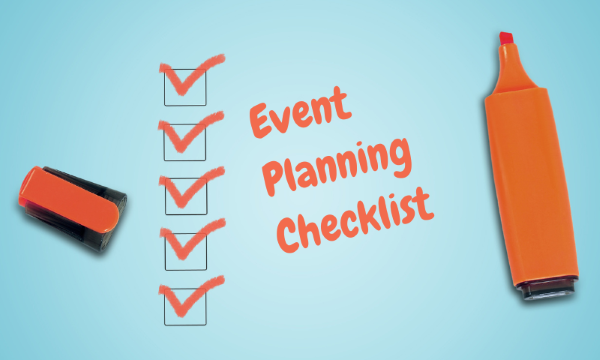
Organizing an event without a roadmap will result in you forgetting many details and encountering many problems. Using a checklist will help you keep track of everything you need to remember. Here you can see an easy-to-read event management guide prepared by Deal Room Experts. You will find all the major steps that you should consider while organizing an event.
Below you will see the main points you should go through while planning your event. Each of the following points is crucial for event planning and setup, and each heading requires proper execution by the relevant team member.
This ultimate virtual event planning checklist includes the following items:
Pre-event stage
Event Day: Execution of the event
Post-event: Evaluation
It is easier to make the planning specific to different phases of the pre-event period. That’s why we will form this checklist based on certain stages. Of course you can modify all the phases, items and definitions based on your event needs. This checklist will be specific to virtual events -whether it is a two-hours webinar or 1 week summit.
We will divide our virtual event planning checklist into 3 different phases: Pre-event, Event-Day and Post-Event.
Since we are mainly focusing on the preparation period of virtual events, a large part of our list will consist of the pre-event phase.
It is important to begin planning your event as early as possible and stick to it throughout the process. Consider the size of your event before implementing your plan. Remember that preparation time will vary depending on the concept, the participant number, and the extra activities planned at the event.If you are planning a closed internal company webinar for instance, even 1 month can be enough to plan it. Yet, for a big global conference, it is necessary to start working months prior to the event. Here we want to keep the pre-period long enough to get prepared properly and let you be ready with contingency plans as possible as you can.
Every event has a purpose, whether you define it properly or not. It is crucial to identify your purpose just like you are building and positioning a new brand, including your target audience.
Unique Value Proposition (UVP).
Your purpose can be informing audiences about industry innovations, recruiting talents for a governmental institution, showcasing your new products or matching startups and investors. Once you define it and put it on paper, any step afterwards should serve that main purpose.
Your event's name creates the first impression of your event. It would be appropriate to name the event in line with its concept and content. In addition, it is crucial to decide the type of event from the beginning. It is essential to determine the most accurate event concept for various event types, including fairs, summits, conferences, award ceremonies, and workshops. Then, you should plan the event according to its concept.
2- Choosing an ideal event date and time
You should pick the best event date to increase event attendance.
Make a list of significant events coming up in your industry. Avoid holding your event on any of these days. Additionally, check to see that your event does not fall on any official holidays before announcing the event date.
The marketing communication plan should outline the best channels for promoting the event, the budget for each channel, and the most functional communication approach. For instance, a marketing communication plan could include advertisements, websites, and brochures. The purpose of planning a marketing communication is to increase people's awareness of the event and their desire for it. Marketers should think about using appropriate language, creating a solid structure, and maintaining the overall communication plan at a high level to deliver clear, understandable, and persuasive materials.
Event marketing timeline, channels & budget: Relevant websites, search engine marketing, social media, billboards, audio, etc.
Prepare and publish a press release: Have one copy of summary, one copy of an extended one with all details. Send the press release to media channels, your network, and influencers.
5- Preparing an event budget (forecast vs actual)
First things first: you must first determine your budget before planning your event. The different stages of planning your budget can relieve some of the initial pressure and assist you in gradually creating a solid budget plan. Decide What Financial Success Means to You. Then, head to Google Docs and make a budget sheet listing all the expenses that will affect your budget, such as staff compensation, facility costs, marketing and PR, sponsorships, etc. Additionally, you must constantly update your budget sheet.
6- Securing event speakers, moderators, MC’s
As an event organiser, you should select well-prepared and impressive speakers who will increase participation and make the event memorable for the audience. In addition, you should invite and inform speakers and conduct any necessary rehearsals with them before the event. To ensure the event runs smoothly, consider providing speakers with a schedule that explains their responsibilities. You should also consider the speakers' potential expectations, such as providing for their transportation and accommodations.
7- Preparing event sponsorship options and looking for sponsors
Sponsorships are the most effective and mutually beneficial way to give events a solid return on investment and a positive culture. Before organising the sponsorship for your event, you should make decisions regarding the scope of sponsorships, sponsors' rights, the terms and conditions of the sponsorship pricing, etc.
8- Choosing your event management platform
Event organisers should decide whether to take registrations through a third-party event registration platform, such as Eventbrite, or through their own website. If you want your attendees to register through a website, you will need to work with a software developer to create an event-specific website and incorporate a payment method.
An online event management platform facilitates and increases the effectiveness of your event management. Deal Room, one of the most widely used event management platforms in the world, serves several functions, such as live broadcasting, B2B matchmaking, registration etc. Additionally, Deal Room is accessible to event managers for all in-person, virtual, and hybrid events.
Designing the ideal event ticket, choosing a pricing strategy, and ensuring a smooth registration process for all your attendees should be top priorities for any event planning efforts. They should all be core elements of your event registration plan.
10- Legal Planning
An integral component of efficient event management is the law. Taking care of various legal issues is a part of event planning. The client and the event planner should have a written agreement outlining expectations, payments, cancellations, and all other factors involved. Before making any legal plans, you should check the venue, the vendors, the event platform, etc. Your legal department should review the agreements that will be made with you after you identify them. To work within the legal requirements of the nation where you hold the event, you should also seek support from a legal expert.
At virtual events, ensuring speakers and moderators have a grasp of using the event platform is crucial. Apart from the rehearsals done days before the event, speakers can log in, check device settings, screen sharing, or interact with other participants 30 minutes before their own session. In case of any technical problems, the event organizer should have a back-up team ready to fix it and save the day. Live support teams should also come to the sessions for help.
After the event is over, it's valuable to analyze the results to see what worked and what didn't. Here are some activities that can help you improve future events.
Here are some activities to do after the event is done:
Keep this list handy to reference throughout the event planning process! Feel free to customize it based on your industry needs. Follow up with a colleague or friend to chat about your progress, or even schedule a time to review the event plan together.
Utilizing an event platform can effectively streamline all event-related processes. An event management platform allows you to register participants, walk sponsors through the event plan step-by-step, and allow attendees to communicate with one another before and after the event. An event management platform can drastically reduce the time needed to complete various tasks. If you wonder how to choose the best event Platform, take a look at our blog post on “How to Choose the Best Event Platform?”
Once you have decided which event platform you will use, you can start setting up your event on the platform. Some platforms provide you event manager support, while others leave you alone with the software. As Deal Room Events, we assign event organizers a dedicated Event Success Manager. Besides, Deal Room is super simple and intuitive to set up the event by yourself.
Deal Room Events provides a comprehensive set of tools for better planning and managing events. With its extensive event management features, you can also design customized event experiences for attendees and sponsors.
You can manage any face-to-face, virtual, or hybrid event with the AI-based platform, which focuses on better interaction and AI-powered matchmaking.
Deal Room Events offers a custom website plugin that allows you to integrate attendees, speakers, sponsors, and industry insights into your event website. A wide range of features is available, including instant chat, B2B meetings, virtual chat rooms, live sessions, advanced filtering, and networking.
Deal Room Events offers a powerful, feature-rich, and cutting-edge event management platform to help you organize better events that bring value, engagement, and leads to everyone. The Deal Room Events professional team is always available to respond to your inquiries and help you if you run into any difficulties.
March 7, 2023

About me:
After seven years of translation experience in the management-related field and a passion for digital marketing, I was given the opportunity to work with the Cloud Markethink Agency and CloudTalk Global, the largest cloud computing event in Eurasia, as a team member to manage business events.
Additionally, working with Deal Room Events has provided me with a wonderful opportunity to reflect on and expand my experience as a content event marketing professional.
Our friendly and experienced team is ready to help.
